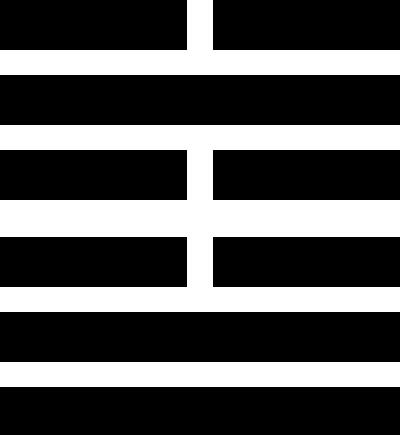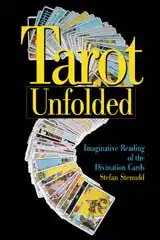
Upper trigram: K'an The Abysmal, Water
Lower trigram: Tui The Joyous, Lake
The Judgement
Limitation. Success.
Galling limitation must not be persevered in.
The Image
Water over Lake: the image of Limitation.
Thus the superior man
Creates numbers and measure,
And examines the nature of virtue and correct conduct.
The Lines
These texts apply only for the lines that were marked, when the hexagram was cast. Note that the lines are counted from the bottom up.
The bottom line marked means:
Not going out of the door and the courtyard
Is without blame.
The 2nd line marked means:
Not going out of the gate and the courtyard
Brings misfortune.
The 3rd line marked means:
He who knows no limitation
Will have cause to lament.
No blame.
The 4th line marked means:
Contented limitation. Success.
The 5th line marked means:
Sweet limitation brings good fortune.
Going brings esteem.
The top line marked means:
Galling limitation.
Perseverance brings misfortune.
Remorse disappears.
The interpretations above and comments below are from Richard Wilhelm's version of the I CHING.
Comments on the Hexagram
A lake occupies a limited space. When more water comes into it, it
overflows. Therefore limits must be set for the water. The image shows
water below and water above, with the firmament between them as a limit.
The Chinese word for limitation really denotes the joints that divide a
bamboo stalk. In relation to ordinary life it means the thrift that sets fixed
limits upon expenditures. In relation to the moral sphere it means the fixed
limits that the superior man sets upon his actions-the limits of loyalty and
disinterestedness.
The Judgement
Limitations are troublesome, but they are effective. If we live economically
in normal times, we are prepared for times of want. To be sparing saves us
from humiliation. Limitations are also indispensable in the regulation of
world conditions. In nature there are fixed limits for summer and winter,
day and night, and these limits give the year its meaning. In the same way,
economy, by setting fixed limits upon expenditures, acts to preserve property
and prevent injury to the people.
But in limitation we must observe due measure. If a man should seek to
impose galling limitations upon his own nature, it would be injurious. And
if he should go too far in imposing limitations on others, they would rebel.
Therefore it is necessary to set limits even upon limitation.
The Image
A lake is something limited. Water is inexhaustible. A lake can contain only
a definite amount of the infinite quantity of water; this is its peculiarity. In
human life too the individual achieves significance through discrimination
and the setting of limits. Therefore what concerns us here is the problem of
clearly defining these discriminations, which are, so to speak, the backbone of
morality. Unlimited possibilities are not suited to man; if they existed, his life
would only dissolve in the boundless. To become strong, a man's life needs
the limitations ordained by duty and voluntarily accepted. The individual
attains significance as a free spirit only by surrounding himself with these
limitations and by determining for himself what his duty is.
The Lines
The bottom line marked
Often a man who would like to undertake something finds himself
confronted by insurmountable limitations. Then he must know where to
stop. If he rightly understands this and does not go beyond the limits set for
him, he accumulates an energy that enables him, when the proper time
comes, to act with great force. Discretion is of prime importance in preparing
the way for momentous things. Concerning this, Confucius says:
Where disorder develops, words are the first steps. If the prince is not discreet,
he loses his servant. If the servant is not discreet he loses his life. If
germinating things are not handled with discretion, the perfecting of them is
impeded. Therefore the superior man is careful to maintain silence and does
not go forth.
The 2nd line from the bottom marked
When the time for action has come, the moment must be quickly seized. Just
as water first collects in a lake without flowing out, yet is certain to find an
outlet when the lake is full, so it is in the life of man. It is a good thing to
hesitate so long as the time for action has not come, but no longer. Once the
obstacles to action have been removed, anxious hesitation is a mistake that is
bound to bring disaster, because one misses one's opportunity.
The 3rd line from the bottom marked
If an individual is bent only on pleasures and enjoyment, it is easy for him to
lose his sense of the limits that are necessary. If he gives himself over to
extravagance, he will have to suffer the consequences, with accompanying
regret. He must not seek to lay the blame on others. Only when we realize
that our mistakes are of our own making will such disagreeable experiences
free us of errors.
The 4th line from the bottom marked
Every limitation has its value, but a limitation that requires persistent effort
entails a cost of too much energy. When, however, the limitation is a natural
one (as for example, the limitation by which water flows only downhill), it
necessarily leads to success, for then it means a saving of energy. The energy
that otherwise would be consumed in a vain struggle with the object, is
applied wholly to the benefit of the matter in hand, and success is assured.
The 5th line from the bottom marked
The limitation must be carried out in the right way if it is to be effective. If we
seek to impose restrictions on others only, while evading them ourselves,
these restrictions will always be resented and will provoke resistance. If,
however, a man in a leading position applies the limitation first to himself,
demanding little from those associated with him, and with modest means
manages to achieve something, good fortune is the result. Where such an
example occurs, it meets with emulation, so that whatever is undertaken
must succeed.
The top line marked
If one is too severe in setting up restrictions, people will not endure them.
The more consistent such severity, the worse it is, for in the long run a
reaction is unavoidable. In the same way, the tormented body will rebel
against excessive asceticism. On the other hand, although ruthless severity is
not to be applied persistently and systematically, there may be times when it si
the only means of safeguarding against guilt and remorse. In such situations
ruthlessness toward oneself is the only means of saving one's soul, which
otherwise would succumb to irresolution and temptation.
Further Reading
Here I add some perspectives on this hexagram, as well as other methods to read its meaning, in additon to what Richard Wilhelm derives from it above.
Meaning of the Trigrams Combined
Each hexagram combines two trigrams, making one the upper and the other the lower. The meaning of the hexagram is mainly derived from that combination. Here's what it means for this hexagram:
Water upon Lake
This part of the text is being edited. It will be added shortly.
Compare to the Reversed Trigrams
It's common to compare a hexagram to the one where the lines are the opposite: a full line is broken and a broken line full. But I find it much more interesting to compare hexagrams with the trigrams reversed: the upper trigram becomes the lower, and the lower trigram becomes the upper. That deepens the understanding of the trigrams at work — when they're not identical. Click the image to see what it means for the two trigrams of this hexagram:

The hexagram with the trigrams reversed
Compare to the Reversed Lines
You can also compare this hexagram to its opposite according to the six lines, where each broken line is full, and vice versa. In some cases it leads to the same hexagram as the one where the trigrams are switched. Here is the hexagram with reversed lines (click it to get to its webpage):

Hexagram with opposite lines
Click the header to read more about the eight trigrams that are combined into the 64 hexagrams.
The 64 I Ching Hexagrams
An I Ching hexagram is composed of two trigrams. Each of the 64 hexagrams has its own name, meaning, and divinatory text. Here they all are, in the traditional order. Click on the image of an I Ching hexagram to get to its webpage.
Use the Facebook field on some of these web pages to comment the I Ching or this website.




































































